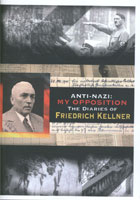
Anti-Nazi: My Opposition. The Diaries of Friedrich Kellner 2006
Distributed by Chip Taylor Communications, 2 East View Drive, Derry, NH 03038-4812; 800-876-CHIP (2447)
Produced by Abella Entertainment. Ltd.
Directed by Fern Levitt and Arnie Zipursky
DVD, color, 66 min.
Sr. High - Adult
History, Holocaust Studies, World War II
Date Entered: 02/12/2009
Reviewed by Linda Kelly Alkana, Department of History, California State University Long BeachThis is an informative and unusual documentary that juxtaposes one man’s opposition to the rise of Hitler in the 1930s and ‘40s with the childhood and coming of age of a Connecticut child, his grandson, in the 1940s and ’50s. The title, Anti-Nazi: My Opposition – The Diaries of Friedrich Kellner, suggests only half the story. The other half concerns Kellner’s grandson, Scott, and how he was affected by the abandonment by his parents at the age of four, his father’s suicide, and the restrictions of his orphanage life.
After high school, Scott joins the Navy, but soon goes AWOL in the mid-fifties during a stopover in Germany, to search for his grandparents. He finds both his grandfather and the incredible diaries of his opposition to the Nazis. In these ten volumes Kellner wrote about his need to record the events around him: “if I could not stop (the Nazis’) progress, I could at least reveal their lies.”
The body of the film goes back and forth between the two stories. A voice-over reads from Kellner‘s diaries which record the rise of Hitler and the ongoing events in Germany. Kellner’s early opposition is in vain, so he moves to the countryside where he works as a minor government official, facing suspicion because he refuses to join the Nazi party. The film explains that he sends his son to the United States because of his fears that the boy was becoming “mesmerized by the (Hitler) Youth movement.” Kellner secretly records his horror as regular people embrace Hitler “like the dumb calf electing its own butcher.” Meanwhile, his son in the U.S. marries a Jewish American woman; before long he abandons her and their three children; she then goes off to join a carnival.
The film makes palpable the child’s pain of abandonment. It shows with reenactment and family photos Scott’s early years with his parents and in the orphanage. One picture with Scott and his parents will clinch their relationship when Scott finally finds his grandparents. Despite not sharing a language, the grandparents embrace Scott and encourage him to get an education and publish the diaries. The film begins and ends with Scott visiting an exhibit honoring his grandparents and the diary.
The production quality of this video is good. It features several narrators and voice-overs, as well as both newsreel and government footage. The war images are appropriately graphic. The film offers an unusual slant toward World War II and the Holocaust focusing, as it does, on the quiet opposition of some Germans as well as the collateral damage of war, seen here in the exile and abandonment of children. Highly recommended.